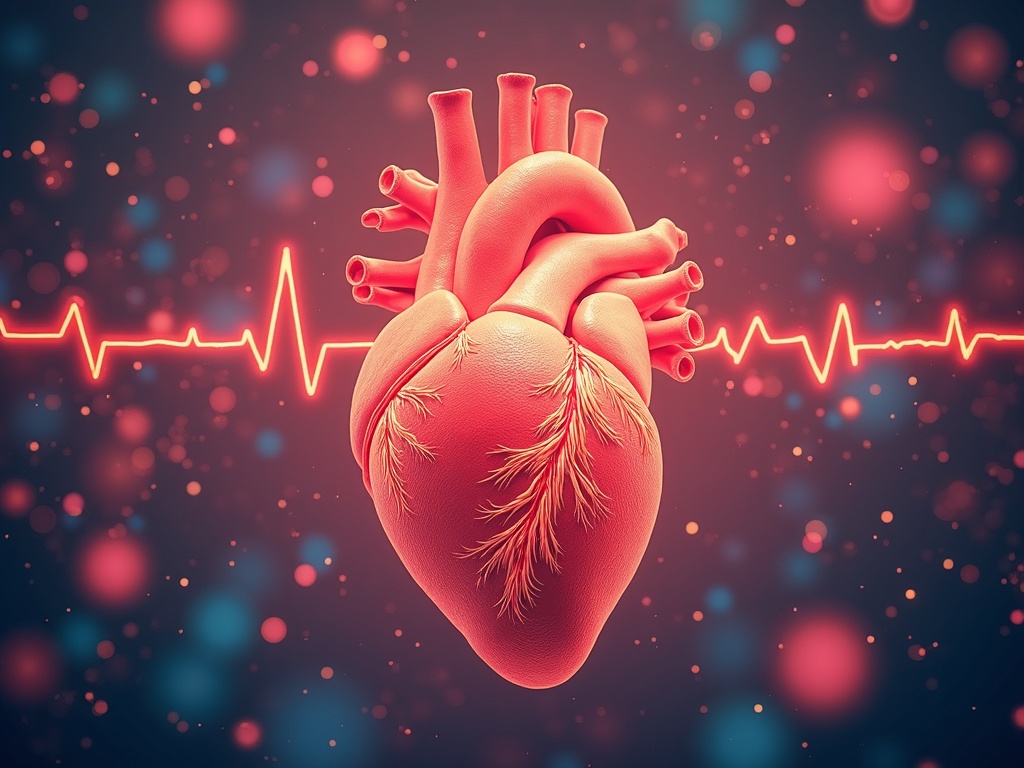Natural Remedies for Heart Palpitations: Finding Calm in the Chaos
Have you ever felt your heart skip a beat, flutter erratically, or pound in your chest for seemingly no reason? That unsettling sensation is known as a heart palpitation, and while it can be alarming, it's often harmless. But what if those palpitations are frequent or accompanied by other symptoms? Before rushing to medication, many people are exploring natural remedies to soothe their hearts and restore a sense of calm. Let's delve into the world of natural solutions for heart palpitations, understanding their potential benefits and how to use them safely.
Understanding Heart Palpitations
Heart palpitations are those moments when you become acutely aware of your heartbeat. It might feel like your heart is racing, fluttering, pounding, or even skipping beats. While they can be triggered by underlying heart conditions, palpitations are frequently linked to everyday factors . Understanding the common causes is the first step in addressing them.
Common Causes of Heart Palpitations
- Stress and Anxiety: The body's response to stress can trigger the release of hormones that affect heart rhythm.
- Caffeine and Alcohol: These stimulants can overstimulate the heart.
- Nicotine: Similar to caffeine, nicotine can increase heart rate and trigger palpitations.
- Dehydration: Insufficient fluids can affect electrolyte balance, impacting heart function.
- Electrolyte Imbalance: Minerals like potassium, magnesium, and calcium play a crucial role in regulating heart rhythm.
- Hormonal Changes: Menopause, menstruation, and pregnancy can cause hormonal fluctuations that lead to palpitations.
- Certain Medications: Some medications, such as decongestants and asthma inhalers, can have side effects that include palpitations.
- Intense Physical Activity: Strenuous exercise can temporarily increase heart rate and cause palpitations.
When to Seek Medical Attention
While many palpitations are benign, it's crucial to know when to seek medical advice. Consult a doctor if your palpitations are:
- Frequent or prolonged
- Accompanied by chest pain, shortness of breath, dizziness, or fainting
- Occurring in individuals with a history of heart disease
Natural Remedies to Soothe Your Heart
If you've ruled out serious underlying conditions, exploring natural remedies can be a valuable approach to managing heart palpitations. Here are several evidence-based options to consider:
1. Magnesium: The Relaxation Mineral
Magnesium is an essential mineral that plays a vital role in numerous bodily functions, including regulating heart rhythm. It helps maintain electrolyte balance and support healthy nerve function, both of which are crucial for a steady heartbeat. Magnesium deficiency has been linked to an increased risk of heart palpitations and arrhythmias.
How to Use Magnesium
- Magnesium-Rich Foods: Incorporate foods like leafy green vegetables (spinach, kale), nuts and seeds (almonds, pumpkin seeds), avocados, and dark chocolate into your diet.
- Magnesium Supplements: If dietary intake is insufficient, consider magnesium supplements. Magnesium citrate and magnesium glycinate are often well-absorbed. Consult with your healthcare provider to determine the appropriate dosage.
2. Potassium: The Electrolyte Balancer
Potassium is another essential electrolyte that plays a crucial role in maintaining healthy heart function. It helps regulate blood pressure, support muscle contractions, and maintain a steady heart rhythm. Potassium deficiency can disrupt the heart's electrical activity, leading to palpitations and other arrhythmias.
How to Use Potassium
- Potassium-Rich Foods: Include foods like bananas, sweet potatoes, tomatoes, oranges, and beans in your diet.
- Potassium Supplements: Potassium supplements are available, but it's important to exercise caution due to the risk of hyperkalemia (excessively high potassium levels). Consult with your doctor before taking potassium supplements.
3. Hawthorn Berry: The Heart Tonic
Hawthorn berry has a long history of use in traditional medicine for supporting cardiovascular health. It contains compounds that can help improve blood flow, lower blood pressure, and strengthen the heart muscle. Some studies suggest that hawthorn berry may help reduce palpitations and improve overall heart function.
How to Use Hawthorn Berry
- Hawthorn Berry Supplements: Hawthorn berry is available in various forms, including capsules, tablets, and liquid extracts. Follow the dosage instructions on the product label or consult with your healthcare provider.
- Hawthorn Berry Tea: You can also make hawthorn berry tea by steeping dried hawthorn berries in hot water.
4. Relaxation Techniques: Calming the Nervous System
Stress and anxiety are major triggers for heart palpitations. Incorporating relaxation techniques into your daily routine can help calm the nervous system, reduce stress hormones, and promote a more regular heartbeat.
Effective Relaxation Techniques
- Deep Breathing Exercises: Practice deep, diaphragmatic breathing to activate the parasympathetic nervous system and promote relaxation.
- Meditation: Regular meditation can help reduce stress, improve focus, and promote a sense of calm.
- Yoga: Yoga combines physical postures, breathing techniques, and meditation to reduce stress and improve overall well-being.
- Progressive Muscle Relaxation: This technique involves tensing and releasing different muscle groups to reduce tension and promote relaxation.
- Spending Time in Nature: Studies show that spending time in nature can lower stress hormones and improve mood.
5. Herbal Teas: Gentle Support for the Heart
Certain herbal teas have calming properties that can help relax the nervous system and potentially reduce heart palpitations.
Beneficial Herbal Teas
- Chamomile Tea: Chamomile has calming and anti-inflammatory properties that can help reduce anxiety and promote relaxation.
- Lavender Tea: Lavender is known for its calming and sleep-promoting effects. It can help reduce stress and anxiety, potentially easing palpitations.
- Lemon Balm Tea: Lemon balm has calming and antiviral properties. It may help reduce anxiety and improve mood.
6. Coenzyme Q10 (CoQ10): Fueling Heart Cells
CoQ10 is a naturally occurring antioxidant that plays a vital role in energy production within cells, including heart cells. Some studies suggest that CoQ10 supplementation may improve heart function and reduce palpitations, particularly in individuals with heart conditions.
How to Use CoQ10
- CoQ10 Supplements: CoQ10 is available in supplement form. Consult with your healthcare provider to determine the appropriate dosage.
7. L-Carnitine: Supporting Energy Production
L-Carnitine is an amino acid that helps transport fatty acids into the mitochondria, where they are burned for energy. Some research suggests that L-carnitine may improve heart function and reduce the frequency of palpitations, especially in people with certain heart conditions.
How to Use L-Carnitine
- L-Carnitine Supplements: L-Carnitine is available as a supplement. Talk to your doctor to see if it's right for you.
Lifestyle Modifications for a Healthy Heart Rhythm
In addition to natural remedies, making lifestyle changes can significantly impact the frequency and severity of heart palpitations.
Dietary Changes
- Limit Caffeine and Alcohol: Reduce or eliminate your intake of caffeine and alcohol, as these substances can trigger palpitations.
- Stay Hydrated: Drink plenty of water throughout the day to maintain electrolyte balance.
- Eat Regular Meals: Avoid skipping meals, as this can lead to blood sugar fluctuations that can trigger palpitations.
- Reduce Processed Foods: Limit your intake of processed foods, which are often high in sodium and unhealthy fats.
Stress Management
- Identify and Address Stressors: Determine the sources of stress in your life and find healthy ways to manage them.
- Prioritize Sleep: Aim for 7-8 hours of quality sleep per night.
- Engage in Hobbies: Make time for activities you enjoy to reduce stress and improve your overall well-being.
Exercise with Caution
- Consult Your Doctor: If you experience palpitations during or after exercise, talk to your doctor.
- Start Slowly: Gradually increase the intensity and duration of your workouts.
- Stay Hydrated: Drink plenty of water before, during, and after exercise.
Important Considerations and Precautions
While natural remedies can be beneficial, it's crucial to approach them with caution and consult with your healthcare provider, especially if you have underlying health conditions or are taking medications.
- Drug Interactions: Some natural remedies can interact with medications, potentially causing adverse effects.
- Dosage: Follow the recommended dosage instructions for all natural remedies.
- Pregnancy and Breastfeeding: Some natural remedies are not safe for pregnant or breastfeeding women.
- Individual Sensitivity: You may be sensitive or allergic to certain natural remedies. Start with a low dose and gradually increase it as tolerated.
Embrace a Holistic Approach to Heart Health
Heart palpitations can be unsettling, but they don't have to control your life. By understanding the potential causes, exploring natural remedies, and adopting a healthy lifestyle, you can take control of your heart health and find calm in the chaos. Remember to work closely with your healthcare provider to determine the best course of action for your individual needs. Your heart is the engine of your life – treat it with the care and attention it deserves.


